Biotechnology
Biotechnology is a branch of biology that involves the use of living organisms, cells, and biological systems to develop products and technologies that improve our lives. It encompasses a wide range of scientific techniques and processes that are used to manipulate living organisms or their systems to create useful products, such as medicines, food, and materials.
Applications of Biotechnology
Biotechnology has a wide range of applications in various fields, including:
- Medicine: Biotechnology is used in the development of new drugs, vaccines, and diagnostic tests. It also plays a key role in the field of gene therapy and personalized medicine.
- Agriculture: Biotechnology is used to develop genetically modified (GM) crops that possess desirable traits such as resistance to pests and diseases, tolerance to environmental stress, and improved nutritional content.
- Environmental Conservation: Biotechnology is employed in the development of bioremediation techniques to clean up environmental pollutants, as well as in the production of biofuels from renewable sources.
- Industrial Processes: Biotechnology is used to produce enzymes, bio-based chemicals, and bio-based materials for various industrial applications.
- Research and Development: Biotechnology tools and techniques are widely used in scientific research to study biological systems and processes.
Key Techniques in Biotechnology
Some of the key techniques in biotechnology include:
- Genetic Engineering: This involves the manipulation of an organism's genetic material to introduce specific traits or characteristics.
- Cell Culture: This involves the growth and maintenance of cells outside of their natural environment, typically in a laboratory setting.
- Bioprocessing: This involves the use of biological systems (such as enzymes, microorganisms, or whole cells) to carry out industrial processes.
- Bioremediation: This involves the use of microorganisms to degrade environmental pollutants and contaminants.
- Cloning: This involves the production of genetically identical copies of a particular organism or gene.
Study Guide
If you're studying biotechnology, here are some key topics to focus on:
- Understanding the principles of genetic engineering and its applications in medicine, agriculture, and industry.
- Learning about the ethical and societal implications of biotechnology, such as the debate around genetically modified organisms (GMOs) and gene editing technologies.
- Exploring the role of biotechnology in addressing global challenges, such as food security, environmental sustainability, and healthcare.
- Gaining an understanding of the various biotechnological techniques and their practical applications.
- Studying the current trends and future prospects in the field of biotechnology, including emerging technologies and research areas.
By mastering these topics, you'll develop a comprehensive understanding of biotechnology and its significance in the modern world.
[Biotechnology] Related Worksheets and Study Guides:
.◂Biology Worksheets and Study Guides High School. Microorganisms I
Worksheet/Answer key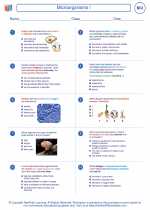 Microorganisms I
Microorganisms I  Worksheet/Answer key
Worksheet/Answer key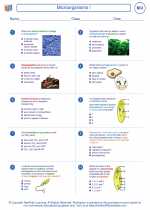 Microorganisms I
Microorganisms I  Worksheet/Answer key
Worksheet/Answer key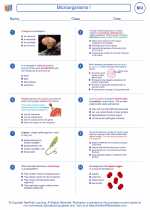 Microorganisms I
Microorganisms I  Worksheet/Answer key
Worksheet/Answer key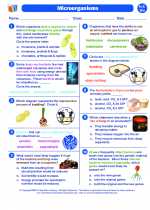 Microorganisms I
Microorganisms I  Vocabulary/Answer key
Vocabulary/Answer key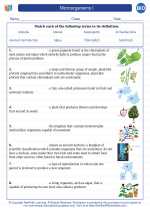 Microorganisms I
Microorganisms I  Vocabulary/Answer key
Vocabulary/Answer key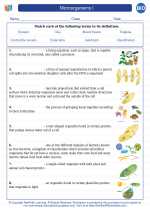 Microorganisms I
Microorganisms I  Vocabulary/Answer key
Vocabulary/Answer key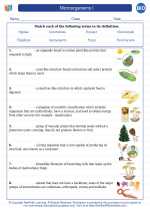 Microorganisms I
Microorganisms I  Vocabulary/Answer key
Vocabulary/Answer key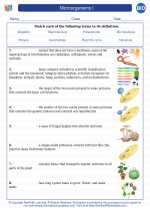 Microorganisms I
Microorganisms I  Vocabulary/Answer key
Vocabulary/Answer key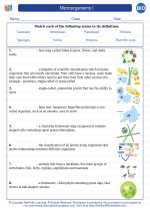 Microorganisms I
Microorganisms I 

 Worksheet/Answer key
Worksheet/Answer key
 Worksheet/Answer key
Worksheet/Answer key
 Worksheet/Answer key
Worksheet/Answer key
 Vocabulary/Answer key
Vocabulary/Answer key
 Vocabulary/Answer key
Vocabulary/Answer key
 Vocabulary/Answer key
Vocabulary/Answer key
 Vocabulary/Answer key
Vocabulary/Answer key
 Vocabulary/Answer key
Vocabulary/Answer key

The resources above cover the following skills:
BIOLOGY
Unity and Diversity
Obtain, evaluate, and communicate information to explain how organisms are classified by physical characteristics, organized into levels of taxonomy, and identified by binomial nomenclature (e.g., taxonomic classification, dichotomous keys).
Engage in argument to justify the grouping of viruses in a category separate from living things.